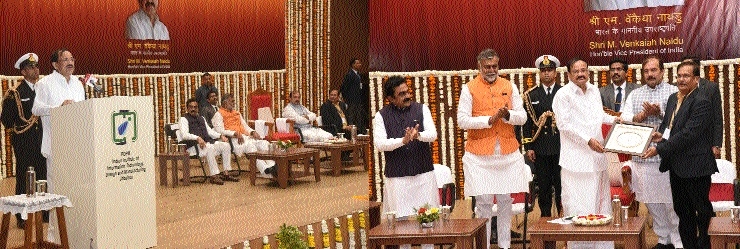Venkaiah Naidu reminds varsities of their ‘Digital Social Responsibility’ in nation-building
| Date :16-Feb-2020 |

(left) The Vice President of India Venkaiah Naidu, addressing the
students and faculty of PGPM IIITDMJ on Saturday. (right)
The Vice-President being honoured by IIITDM Director Jain.
(Pics by Anil Tiwari)
Staff Reporter :
Interacts with students of PDPM Indian Institute of Information Technology, Design & Manufacturing
“If the benefit of digital technology and e-governance has to reach the last man of the society, it has to be in Indian languages. The students and academia have a duty to create more digital content in Indian language, as it will be their ‘Digital Social Responsibility’ for nation-building process. Low level of digital literacy, especially in rural India, is a matter of concern and we need to work on this to increase digital literacy targeting our schools and colleges,” opined the Vice President of India, M Venkaiah Naidu.
Vice President Naidu while interacting with students and faculty members at PDPM Indian Institute of Information Technology, Design & Manufacturing (IIITDM), Jabalpur, called upon them to come up with innovative ideas to address the problems faced by the country making best use of technology for easing people’s lives and bring transparency in governance. Union Minister of State for Tourism and Culture Prahlad Singh Patel, Finance Minister of Madhya Pradesh Tarun Bhanot, Member of Parliament Rakesh Singh and Director of IIITDM Sanjeev Jain were among the dignitaries who graced the occasion. He appreciated IIITDM move to be in an active partnership with several Japanese universities and companies to provide better exposure to its students.
“Universities should not only be the knowledge hubs but also need to emerge as the hotspots of research, incubation and innovation to improve industry-academia linkage,” he expressed. Praising the Government’s move to set up more than 5,400 Atal Tinkering Labs in schools across the country, he appealed other institutions to promote the spirit of innovation and entrepreneurship among the students. The Vice-President mentioned about the aim to build an inclusive society in which every person feels integrated in nation’s development.Urging universities to prepares the youth for 21st century industry need, he said that with right skills, Indian youth can not only increase the pace of economic growth in India.
Talking about crucial role of institutions like IIITDM, he explained about institute’s responsibility to create professionals specialized in ‘Smart Manufacturing’ to address the shortage of high-tech human resources in the country.“With 65 per cent population below the age of 35 years, India has the right demographic capital to emerge as skill capital of the world,” he said.However, the Vice President cautioned that mere degrees and diplomas will not make a person employable and emphasised the need for skilling to take full advantage of the opportunities in the globalised and liberalized economic environment.“Skilling and schooling should go together and we need to move towards education and research in mother tongue. There should be concerted efforts to improve teaching methods in our universities to improve the learning outcomes.
It is a sad state of affairs that none of our universities figure in top 100 universities of the world,” he said.Discussing various challenges and opportunities on the economic front, the Vice President expressed concerns that India despite being world’s fifth largest manufacturer, share of manufacturing in our GDP has remained around 16 per cent.“Our aim is to increase this share to 25 per cent of GDP”, the Vice President said while listing various government initiatives to promote manufacturing such as Make in India, Start-up India, MUDRA and Stand-up India, easy availability of credit to MSMEs and setting up of industrial corridors.He said that MSMEs face more challenges as compared to bigger corporations in adoption of new technologies and exhorted the institutions such as IIITDM to address this by creating professionals who specialize in ‘Smart Manufacturing’.
For that, we have to rapidly adopt and assimilate new technologies like artificial intelligence, data analytics, machine-to-machine communications and robotics. It would be pertinent to note that SMEs are facing a bigger challenge than the organised large-scale manufacturing in adoption of these technologies.Expressing disappointment over the fact that none of the Indian universities figures in the top 100 global institutions, he called for concerted efforts to improve the teaching methods and the learning outcomes.He emphasized over the need to raise expenditure on research and development and appealed the private sector to join hands with the universities. He even called for the creation of a separate corpus by the corporate sector to promote cutting edge research in higher education institutions and universities.He also called for making cyber security an inalienable part of all our digital literacy programs to help in faster adoption of technologies